 |
| Prunus virginiana |
Something about this spring has had me on edge.
I'm not sure why--could be family events, personal thoughts, or other factors completely unrelated to gardening. Nothing major, just a strange sense of joyful anticipation mixed with minor anxiety.
But some of my thoughts, as always, have centered on the garden and the weather. Making peace with this edgy moodiness is the biggest lesson I've learned this spring.
As I reflect on "Garden Lessons Learned" during the past three months, the biggest one is to simply take it all in and accept that Mother Nature's miracles will happen on their own time.
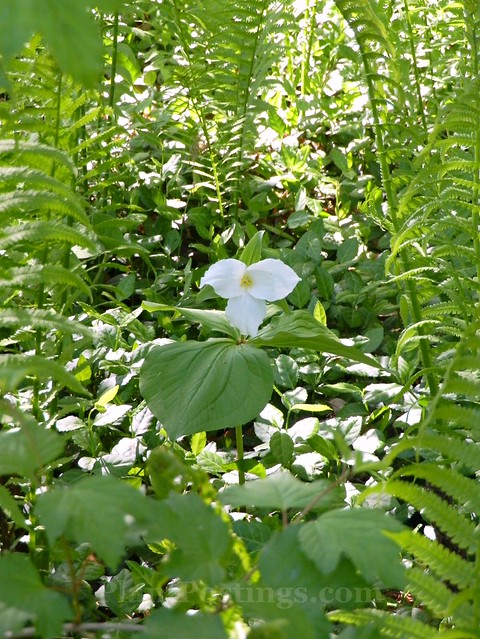 |
| Trillium grandiflorum |
Like the appearance of the Trilliums: If they don't pop up after the first few warm spells, don't worry. They might know something you don't--like, perhaps there will be a few more frosty nights before the warmth settles in for the season.
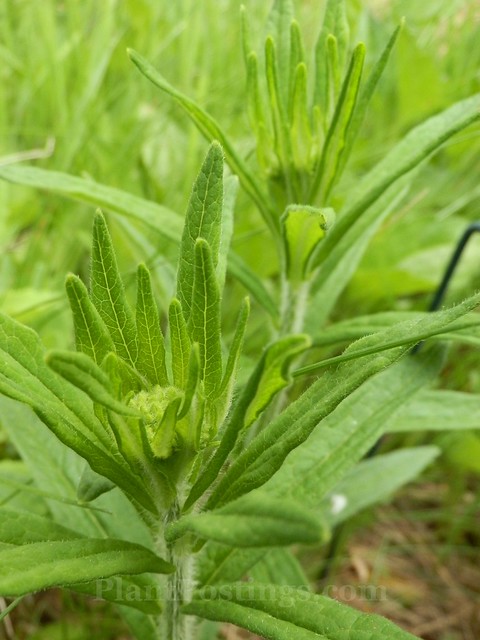 |
| Asclepias tuberosa |
Same for the Milkweeds. Once they emerge, the Monarchs can't be far behind. And we don't want Monarchs freezing because they made the trip too early.
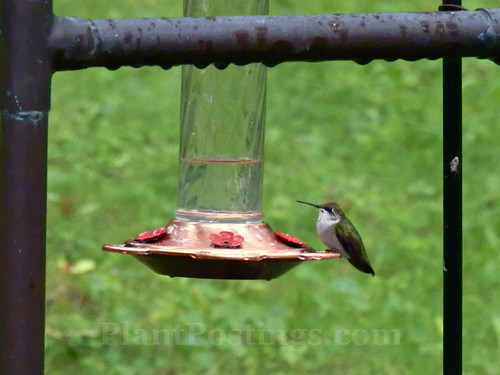
Hummingbirds will find their way back to your garden. Give them the blooming plants and the nectar they need, and they'll find their way back to you.
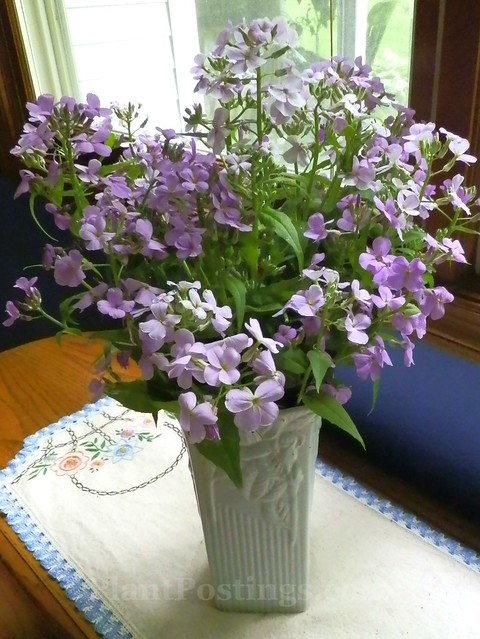 |
| Hesperis matronalis |
You know you're going to have to pull invasive plants like Garlic Mustard and Dame's Rocket. Wait until the plants are a little larger and after a good rain (but before they go to seed). They'll be easier to pull. Plus, the Garlic Mustard tastes great in salad, and the Dame's Rocket is lovely in a vase.
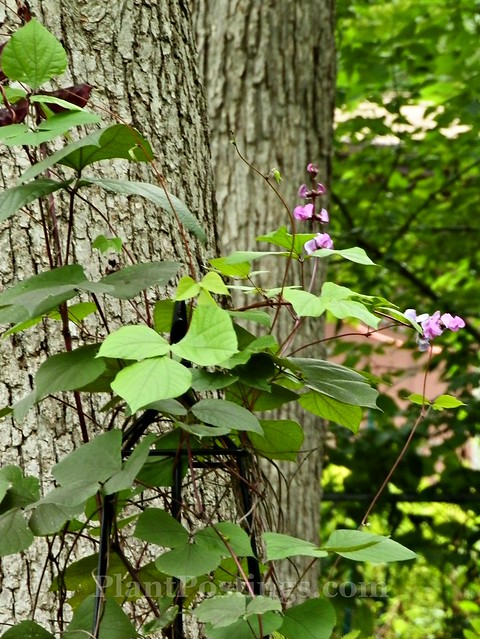 |
| Lablab purpureus |
Grow Hyacinth Bean vines from seed. But don't put them directly in the cold, wet ground. Grow them in pots under a coldframe, instead. They'll warm up and grow into healthy, solid plants ready for planting in the warm, late May soil.
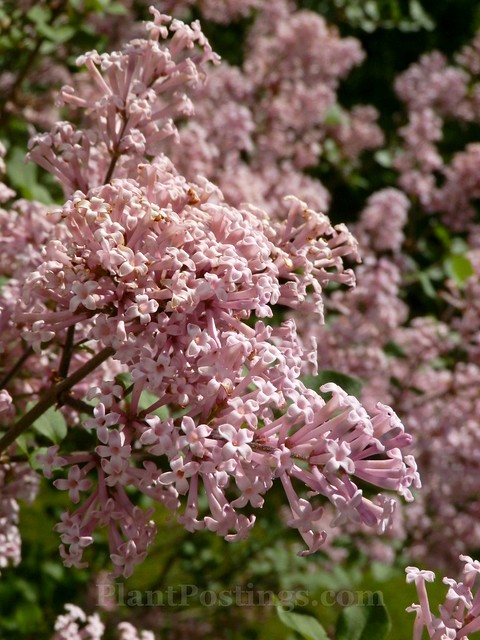 |
| Syringa meyeri 'Palibin' |
When Magnolias, Crabapples, and Lilacs are all blooming at the same time, don't be sad that springtime is passing. Instead enjoy the magic of the moment.
These are not so much lessons in patience, which is a given, but lessons in watchfulness and mindfulness ... enjoying and observing what's happening now, instead of anticipating what you think should be or will be happening very soon.
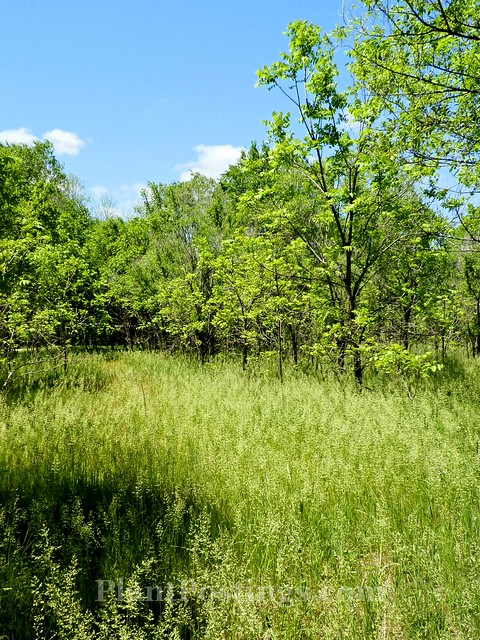
What did you learn this season? To join in the "Garden Lessons Learned" meme, simply write a post or share one you've already written about lessons you've learned during the past season. Then share your links or simple observations in the comments. I'll keep this post up for a few days, and it will be available always under the "Lessons Learned" tab at the top of this blog.
Please also join in Donna's Seasonal Celebrations at Gardens Eye View! Feel free to join in with a post that fits both memes, or separate posts for one or both of them.
I love the composition of that first one, when seen isolated in that pic with those framings, it looks like the most special plant in that area. Pictures really are deceiving because i knew there could be lots of it in the vicinity. And that Lablab is also growing here, i guess it is a tropical vine. We have it as weeds in the property.
ReplyDeleteThanks. The woods behind our house are thick with plants and, currently, prominently foliage. There are several Chokecherry trees, and their beauty is somewhat understated, but very lacy and graceful. Interesting that Lablab grows as a weed by you. It grows fast during the summer here, but it dies when it freezes.
DeleteVery important lessons to learn - yet difficult to master! I learned not to thin out my carrot seedlings as the garden fauna will do it for me!!
ReplyDeleteHi Tim: Yes, definitely difficult. Sometimes I simply need to stop for a few minutes and take it all in. The beauty of growing things can be overwhelming when they unfurl and bloom at the same time. Good lesson about the carrot seedlings!
DeleteA lovely reflection and great tips to incorporate. susie
ReplyDeleteThank you! I say I learned this lesson, but truthfully it's a lifelong struggle. We search for meaning and beauty constantly. Most of the time, it's right in front of us if we simply pause and observe. :)
DeleteThis is a lesson I keep learning and re-learning. The crabapples were exceptional this year and lasted much longer than usual--I think I really drank in everything around me each day that they were in bloom. I need to remind myself to do that every day. Seeing your vase of Dame's Rocket made me laugh: a few years ago, Beckie and I kept spying some pink flowers growing everywhere along the roadside and thought they might be some kind of phlox. One day I went across the road and dug some up--the neighbors asked me later what in the world I was doing:) I transplanted them in my butterfly garden but they soon died. Seeing your photo, now I'm pretty sure they were Dame's Rockets; I think I'm glad they didn't make it here:)
ReplyDeleteMe, too, Rose; me, too. I truly think it's a lifelong human struggle and lesson. Just when I become satisfied that I have things figured out, I fall back into old routines of rushing and ignoring the beauty of the present moment. Re: the Dame's Rocket, I never thought before to put those masses of lovely blooming "weeds" in a vase. Duh. As long as I pull them before they go to seed, I might as well enjoy them. There are Dame's Rocket flowers blooming everywhere in the ditches and woodland openings around here. It's too bad they're so invasive, because they are beautiful.
DeleteGardens are full of life lessons, aren't they? I failed the living in the moment one.
ReplyDeleteI keep waiting for the "big show", which is nearly here....I love each plant but really love the garden as a whole when that happens! Happy Gardening!
Yes! And I learn and re-learn these lessons every day. ;-) I'm still working on the living in the moment thing. Sometimes it works, sometimes it just doesn't. I guess more than anything else, I'm making peace with the fact that I'm imperfect, failing, winning, living, and learning constantly. We're kinda past the first big show here in my shade garden. The second big show will happen in a few weeks when the tiny potager hits its stride. The third big show will be the autumn blooms and colorful foliage. Enjoy the beauty! Happy gardening to you, too!
DeleteA perfect lesson Beth, and one I continue to embrace each season...I will be joining in on my other blog on Thursday....I do love using the 'weeds' in vases too....some are pretty misplaced plants that can make a lovely display. Mother Nature is such a great teacher!
ReplyDeleteThanks for collaborating and joining in, Donna. :) I'll be posting about seasonal celebrations later this month after the Fling. Most invasive weeds are perfectly fine plants in a different setting, of course. So, as long as we have to lift them, we might as well enjoy them before we discard them. Yes, nature is an amazing teacher.
DeleteHere's my link Beth....hope you enjoy the story!
Deletehttp://www.livingfromhappiness.com/wildlife-lessons-rabbits-return/
Thanks, Donna! Love your lessons!
DeleteIt's all about patience and learning not to wish our lives away I think. Everything comes to he who waits and no amount of hoping and wishing will bring on spring any quicker. Enjoy what and when we can as each day passes. Great lesson Beth.
ReplyDeleteYes, I agree, Angie. Although it's not so much a lack of patience with me as worry and moodiness. Worry, that a plant hasn't survived. Or moodiness, when I think about the passage of time. The only way I've found to make peace with that is through prayer and making a concerted effort to focus on what's happening now--not what has happened or what will happen. Yes, we must enjoy each day's beauty. Peace. :)
DeleteSome good garden lessons -- and I guess the shortened appearance of the trilliums was with good reason this year. The weather seems to be yo-yoing more than usual this spring. I'm loving the pockets of dame's rocket along the bike paths and inside the Arboretum, and those hyacinth bean plants are really cool.
ReplyDeleteYes, the yo-yo affect is annoying, isn't it, Heather? The one good thing is that the flowers have lasted longer (in spurts, anyway). I agree--the Dame's Rockets have been lovely (though invasive) this spring.
DeletePatience is something that I lack, but I think my garden makes me calmer and more relaxed. Thank you, Beth, for your thoughts...
ReplyDeleteGardening, and viewing gardens and nature, definitely calm me, too, Tatyana! I'm looking out at the garden now on a near-perfect day, and smiling. :)
DeleteEnjoying and observing now - that's the quiet walk around the garden to see what's happening. Buds I watch ... and suddenly the flower is there. Tomorrow must check if the slipper orchid is fully open.
ReplyDeleteYes, absolutely. That ability/activity is a blessing, isn't it? It's so fun to see what's popping up and blooming each day! Enjoy, Diana.
DeleteDear Beth, for me one word sums it all up: Mindfulness. I think the way you put it "enjoying and observing what's happening now, instead of anticipating what you think should be or will be happening very soon" not only will make a happy gardener, but a happy person as well :-)!
ReplyDeleteWishing you a great week!
Christina
Yes, I agree, Christina. Some are not comfortable with the word "mindfulness," but it certainly conveys the need to focus on and appreciate the here and now! I believe this will be a lifelong lesson for me. The days are so much more pleasant and rewarding when we do this.
DeleteNice life lessons. I especially admire and aspire to the one about enjoying the magic of the moment. Of course, one thing I have tried to accomplish (still trying!) with my garden is to have a succession of flowers throughout the year, that way there is always something in bloom, always something to admire, moment after moment after moment...
ReplyDeleteHi Aaron: I'm trying to do the succession thing, too. Although now that we're thinking about moving, I'm cautious about putting too much $$$ into new plants. Thinking about plants I can divide or take with me ...
DeleteMy lesson would be learning patience to adapt (back) to a new climate, I look around to find familiar signs of spring and what I find is summer already and it's only June 2nd!! What will it be in wo months time? I miss so much the beauty of northern spring time with all its colors, scents and variety of plants and flowers. I will have to go back to my archives to post in my blog and at least live through it, and of course though other gardener's blogs. Thanks
ReplyDeleteLula: That does seem difficult, moving from Mediterranean to temperate, and back to Mediterranean climates. I'm a bit wimpy with our very cold winters here in the Midwest U.S., although I've lived here all my life. Still, winter (or even a few weeks) in Florida or Spain or Mexico would be fabulous!
DeleteA nice lesson and beautiful photos, I have tryed to enjoy the moment, take some thing from every day no matter what the weather brings, my garden looks lovely this year, It's me that's been bothered about the cold and the rain not the plants..
ReplyDeleteAmanda xx
Thanks, Amanda. Your lesson is a good one for all of us! I must agree with you, and the last bit rings true. :)
DeleteSuch an important lesson, Beth, in the garden and in life! This year my One Little Word is 'present' and I find that the easiest times to feel present are in the garden. There I can be mindful of the plants, the birdsong, the breeze, and the way the light touches the blossoms and leaves. It's definitely a challenge to be 'present,' but one I want to continue to practice! Enjoy your garden today! ♡Dawn
ReplyDelete"Present" -- yes. I seem to practice that a little better during the summer, for some reason. Spring just happens and leaves me way too fast! Although I LOVE spring, too. Enjoy your garden, too, Dawn. :)
DeleteLessons are learned every season. Patience is probably the most important of the lessons gardeners learn.
ReplyDeleteYes, agreed. Actually, little lessons happen to me every day. The garden (and nature) are so awe-inspiring, and they're great teachers, too. :)
DeleteI really appreciated your candor in this post--wonderful observations and ones I can relate to...My lessons have all been about change this spring. Loss and Change. And in addition, growth and strength. I find that there is strength in me I didn't know I had. Thank God for that.
ReplyDeleteThank you, Susie. I'm thinking about you. Finding that strength is a big "ah-ha." It doesn't reduce the pain, but it helps us survive. Hugs.
DeleteI find each year here brings the unexpected. It has become harder to design creatively anymore due to weather unpredictability. Your photos in this post are very pretty. A nice collection and variety. Nice post, Beth.
ReplyDeleteThank you, Donna. I'm finding that I'm looking toward plants that are native, but will tolerate a wide range of conditions. I'm not adding many new plants because we hope to move in a few years, but when I do I want them to be survivors and to support local wildlife. There are exceptions, but that's my trend. I agree: Each year brings wide swings and unexpected conditions. It's challenging for the designer and the caretaker.
DeleteAbout an hour after a plant reaches its mature size and is just perfect, it starts to overwhelm its neighbors and be too big. All that waiting for perfection is pointless. It will never really arrive.
ReplyDeleteYes, so true! I think that's why my favorite stage of any bloom is just before it hits peak. Or even in bud stage. There's so much promise just before maturity. And the colors are often more vivid then, too.
DeleteThe terms "watchfulness" and "mindfulness" are good descriptors of what the connected gardener does in the garden. I really like this post and its reminders of our role in the caretaking of our plots of the Earth
ReplyDeleteThanks. It's fascinating and rewarding to realize our small part (along with those of the other creatures in our habitats) in the world around us. Nothing gives me more joy than watching and caring for the "show" all around me. What an incredible gift!
DeleteI've learned to just let go when an insect attacks a plant I love. Spider mites have ravaged my phlox but aside from giving the phlox loads of liquid kelp, I need to just leave them be to recover. It will be an experiment in their hardiness as well as mine. They should releaf and be just fine.
ReplyDeleteYes, this is difficult for me, too. I must admit, I'm not as patient with the spider mites, though. But I usually simply remove some of their webbing so they don't get out of control. No harsh chemicals for me. Good lesson, Tammy.
DeleteBeautiful post Beth..... I am a novice and soak it up..... Michelle
ReplyDeleteThank you, Michelle. We're all novices at something. That's one of the great joys of life on earth: We can learn new things every day!
DeleteA lovely post and gorgeous photos. How wonderful to have hummingbirds and Monarch butterflies in your garden. I didn' t know you could eat garlic mustard, I always leave a little for the Orange tip butterflies.
ReplyDeleteThank you, Chloris! Garlic Mustard is invasive here, so I remove all of it, if I can. We don't have the Orange Tip butterflies here, and as far as I know, Garlic Mustard's only benefit in North America is as an ingredient in salads and sauces. ;-)
DeleteWonderful springtime post! I don't have any pink Syringa like you have. It must be lovely. You are quite lucky to have so many Monarchs. I don't think we are part of their migration pattern here in the Pacific Northwest, but I could be wrong. On the upside, I have bees like crazy over all my Ceonothus. Remember that Rainier Maria Rilke quote: "Earth, I need no more of your springtimes to remind me. One. Just one is already too much for my blood." Doesn't it feel that way this spring, especially after the winter you had....Love to you, Susie
ReplyDeleteThank you, Susie! The Dwarf Korean Lilac is actually more of a lilac/pink, but depending on the light it can look more pink or light purple. I'm hoping I'll have Monarchs in my garden again this year. Many people in the area have reported seeing them, but I haven't yet, although I was away for about a week. Great quote! And, yes, I agree ... although fortunately I escaped the worst of it in late February and early March. Blessings, Susie.
DeleteI'm a little late to the party but so glad I came, Beth. This posting is truly lovely, in both words and pictures. You have given me much to ponder and absorb. 'Watchfulness and mindfulness' especially resonate with me.
ReplyDeleteMy humble contribution is at http://pamsenglishcottagegarden.blogspot.com/2015/06/summers-eve_18.html
Enjoy the summer season. P. x
Such a lovely post, Pam. Your garden looks so graceful and comfortable. Thanks for joining in!
DeleteI'm a little late, too, but that seems to be the story of my life lately. I was feeling a little philosphical this time as I thought about what I've learned this past season. My post will be up later tonight or early in the morning at www.prairierosesgarden.blogspot.com
ReplyDeleteThanks for joining in, Rose! I look forward to reading your post. Things have been crazy hectic around here, too. I'm glad you wrote a thoughtful post. I've been thinking about venturing in that direction lately, too. Happy summer!
Deletegreat post, Beth. I'm far too late, but never late than never! My post is at http://slowgardener.blogspot.com.au/2015/06/how-gardens-changed-me.html.
ReplyDeleteExcellent post, Sue. Thanks for joining in!
DeleteOh I am so glad I discovered this! I just did a post on things i had learned from the world wide web, and Sue told me about this meme. Here is my link http://africanaussie.blogspot.com.au/2015/07/what-have-i-learned-from-world-wide-web.html. You look like you live in a forest! :) I live in the rainforest in North east Australia.
ReplyDelete